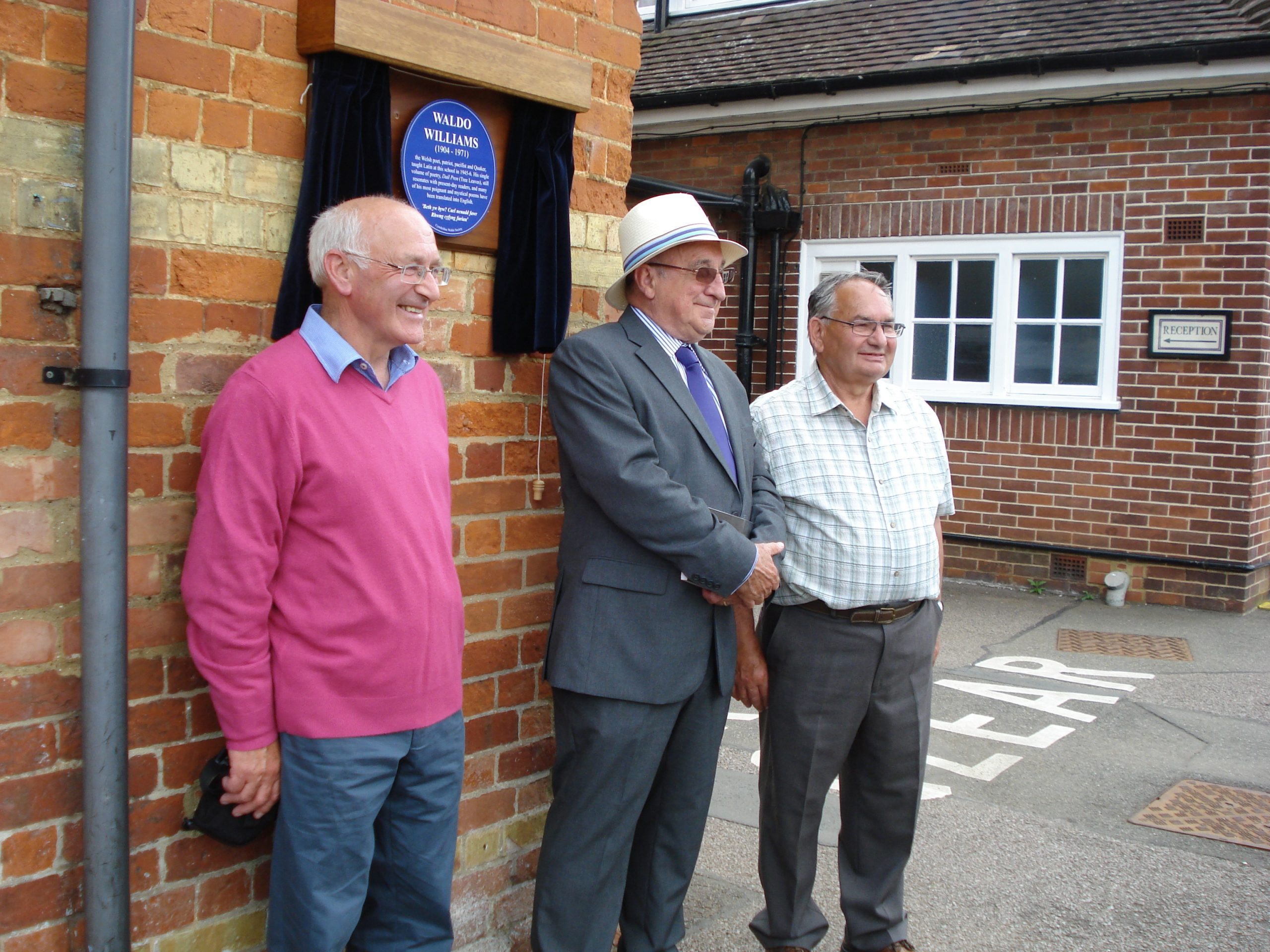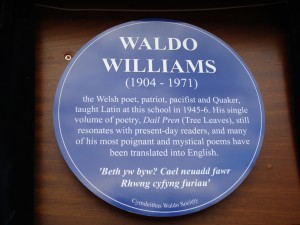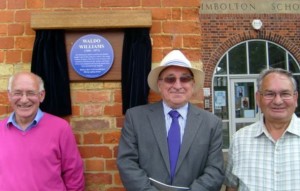
Waldo Williams’ would have approved of the enforced absence of the shepherd of the Preselau at the ceremony in Kimbolton near Huntingdon.
If the Welsh pacifist-poet had known that a plaque was to be unveiled in his memory at the public school where he taught for a short while, he would have mumbled to himself, ‘what nonsense are they up to now?’
If he had known that the necessity of shearing a few hundred sheep had kept Cerwyn Davies, chairman of Cymdeithas Waldo Association, within sight of the mountains, he would have advised the rest of the contingent to stay at home to shear as well. He had no ambitions of becoming a celeb.
However, that was not how it was to be as Hefin Wyn deputised as master of ceremonies on Saturday afternoon, July 2, 2011, in the heart of one of the most English of English countryside’s.
As the Archdruid Jim Parcnest, the representative of all Welsh poets, addressed the small crowd, a cricket match was being played on the splendid lawns of the castle school. It was also the annual Old Kimboltonians get together as gallons of tea and mounds of sandwiches were served.
The Archdruid was oblivious to all this activity as he referred to Waldo’s period of exile in England when he composed some of his most patriotic poems. Among them was ‘Preseli’, (composed when he had moved to Lyneham, Wiltshire) a poem motivated by the threat, at the time in 1946, to take-over some 200 farms in North Pembrokeshire in order to establish a permanent military training ground. T. James Jones read the original poem along with Tony Conran’s translation.

John Greening, the school’s current English teacher and himself a prolific poet, also took part in the ceremony. He read one of his own compositions imagining Waldo’s reaction to the still active military airfields when he moved to West Perry nearby during the last months of the Second World War as well as the intention to create a huge damn to serve the needs of city conurbations.
The English master proclaimed Waldo to be a bard of European stature and expressed the hope that the plaque at Kimbolton School would raise his profile and encourage others to read his poems which John Greening described as being infinitely above the mediocrity of much English poetry.
One of Waldo’s ex-pupils at the school, Mick Rich, a retired solicitor by now, said he often wondered, on learning of the Latin teacher’s later life, what he would have done if asked to represent him at one of those court appearances when Waldo refused to pay income tax in protest against warmongering. He asked himself what mitigating circumstances he would have advanced but came to the conclusion that Waldo would not have wished for any excuses to be made on his behalf as he took full responsibility for his actions.
Mick Rich vividly remembered Waldo’s bushy eyebrows and his habit of raising his arms in frustration when the pupils failed to master some aspect of the work or when he failed to convey what to him was perfectly understandable.
The master of ceremonies referred to Waldo’s description of himself during this period as a stricken deer that had left the herd of his own volition after he had lost his wife following a short-lived marriage. The Archdruid had earlier emphasised that Waldo had not escaped in order to forget Linda in his grief and hiraeth but had moved to the area in order to deepen his appreciation of her and to realise that she was his inspiration as if she were a small bird high above the thorns of the world.
 The plaque itself was unveiled by Teifryn Williams, one of Waldo’s nephews, with the help of Mick Rich. Teifryn said that they as family members were aware of their uncle’s stature as a poet but that in essence to them he was a kindly uncle who was a dab hand at cooking apple tarts.
The plaque itself was unveiled by Teifryn Williams, one of Waldo’s nephews, with the help of Mick Rich. Teifryn said that they as family members were aware of their uncle’s stature as a poet but that in essence to them he was a kindly uncle who was a dab hand at cooking apple tarts.
Finally, Nora Butler, Chairman of Kimbolton History Society, addressed the gathering. Without her support and enthusiasm the unveiling would not have been possible.
As he closed the ceremony, Hefin Wyn predicted that many pilgrims would find their way to Kimbolton in the future to see the unique plaque and that Cerwyn Davies, the Preseli shepherd, would be among the first.
A powerful rendition of the Welsh national anthem, ‘Hen Wlad Fy Nhadau’ led by members of Huntingdon Male Voice Choir and the London Welsh Male Voice Choir concluded the proceedings. Both choirs invariably sing one of Waldo Williams’ poems ‘Tangnefeddwyr’ (Peacemakers) as part of their repertoire.
